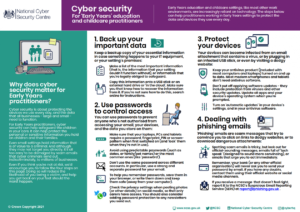Early Years practitioners: why does cyber security matter to you?
New guidance from the NCSC can help safeguard the children in your care, and also your setting’s reputation.
The National Cyber Security Centre has published guidance specifically aimed at the Early Years education and Childcare sector in the UK.
The new guidance aims to help practitioners reduce the chances of falling victim to a cyber attack, and to help them recover from an incident if one does occur.
The four key steps for practitioners to follow are:
- Backing up your important information – identifying what data you couldn’t operate without or are legally obliged to safeguard and creating a proper back-up.
- Using passwords to control access to your computers and information – switching on password protection; using strong passwords and password managers; setting up two-factor authentication and communicating safely with families
- Protecting your devices from viruses and malware – turning on antivirus products and keeping IT devices up to date
- Dealing with suspicious messages (phishing attacks) – tips for spotting suspect messages and unusual requests, reporting these messages and what to do if you have already responded.
Early Years practitioners: why does cyber security matter… – NCSC.GOV.UK
Please also see related NCSC news and guidance in full.


